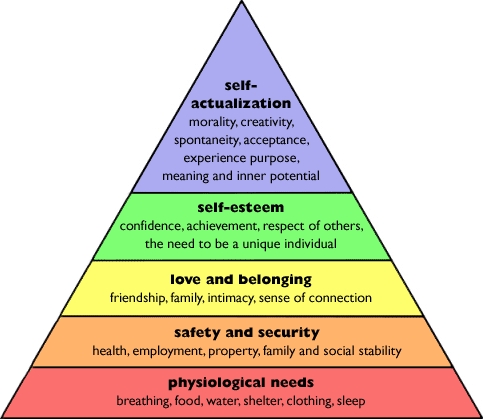
In his book "The Inside Out Revolution", Michael Neill talks about a situation where a man who’s just turned 30 comes for coaching. It’s his time to take over the family carpentry business. He wants to get help on how to modernize the business so it can remain competitive and relevant.
But as they are talking, the coach gets a strange feeling. Something feels out of alignment. He checks the client’s data, where it stands that his name is Jesus and he comes from a small town in Israel, called Nazareth.
The question Michael Neill asks is this: should the coach work with him on becoming more successful in his carpentry business?
Well, we all know the answer. We also know that Jesus most likely never went to a coach or an elder to consult about his future, because he knew deep inside that he had a different mission. Each of us has a mission, too, but how many are aware of it? How many of us are trying to cope with stress and burnout that we experience at our job, when we shouldn’t even be in that career? How many are trying to fit ourselves to the job, when in fact, we should find a job that fits us?
One of the main reasons for this predicament is that we are unable to choose better, even if we’d want to, and that’s because we are unconsciously driven by our unmet needs. Our unmet needs make us choose less than optimal solutions, both in our professional and private lives.
Our basic emotional needs
We all have basic human needs, and if we were lucky, those needs were met during our childhood. The basic human needs are described by Maslow’s hierarchy of needs. At the base of the Maslow’s pyramid are physiological needs, followed by the safety needs. The third level is the need for love and belonging, the fourth is the need for esteem and accomplishment. The highest level is the need for self-actualization.

All those needs (except the self-actualization need, which becomes relevant only in adulthood) would ideally be met in various phases of the child’s development. In the earliest weeks and months, the most acute are physiological and safety needs. Later they get expanded by the love and belonging need, and later the esteem need.
There can be many reasons why those needs weren’t adequately met in our childhood. The safety need can be compromised by e.g. a difficult birth, or being frequently sick as a baby and away in the hospital, separated from our parents. It can also be an unstable home, with severe poverty, or even drug abuse or violence. Another reason could be that our mother was under a lot of stress, she might have been afraid to have a baby, felt incapable of being a mother and therefore couldn’t provide that basic sense of safety to us. It’s a range of possible causes, which can all lead to our lack of sense of safety and security, which we carry with us to adulthood.
As an adult, we might not even be aware of this need for safety, but it will nevertheless manifest in important life and career choices. For example, we might prefer safe and secure jobs, even if we feel bored and unmotivated. We find various excuses why we stay at the job, but the real reason is the unmet need for safety. That’s the driving force behind our fear and hesitation to make a move.
Our love and belonging need might have been compromised by e.g. being left at our granny’s as an infant for prolonged periods of time, because our parents worked abroad and couldn’t take care of us. Or it might have been frequent criticism by our parents, shaming and ridiculing, which left us with the belief that we are unlovable. Later as adults, we might be afraid that if we don’t choose the career our parents wish for us, we’ll betray them. If we choose our own way, we reckon, we’ll lose our parents’ love. That’s how our unmet need for love and belonging keeps us stuck in an unfulfilling career, in which we can never thrive.
An unmet need for love and belonging is also at the core of relationship problems. Because we want to desperately feel loved, we might agree to a relationship where the partner doesn’t respect us and might even be abusive. We tolerate it out of fear that we’ll be left alone and that no one else will want us.
Our esteem need might have been compromised by e.g. having a narcissistic parent who instead of encouraging and cheering us on, competed with us, and regularly shamed and ridiculed us. We start believing we’re never going to be good enough and we develop self-esteem problems.
As adults, we might behave very competitively at our work place, often bragging and perhaps even putting others down, in this way trying to extort respect from our colleagues. But of course, we’ll produce a counter-effect and people will start avoiding us. Our need for respect and validation won’t be met, and we’ll feel angry and frustrated, similar to how we’ve felt with our parent.
Our unmet needs are somewhat like an undercurrent that keeps us stuck in one place, no matter how hard we try to swim to get out of it. For example, someone might suffer a great deal at their job, feeling exploited and unappreciated, and yet they won’t have the courage to stand up for themselves, or ask for a raise, or leave, because of their unmet need for safety. They might also believe they deserve that job because they aren’t good enough for anything else, which indicates an unmet esteem need. These two combined – fear for their existence and the belief of not being good enough – is a recipe for staying in their predicament for a very long time. Unless they become aware of the deeper problem and start working on it.
How do we know we have an unmet need?
If we have an unmet emotional need, we might feel a deep longing and a sense of emptiness. We might often feel angry, frustrated and complain a lot, but never do anything to change our situation. We might feel afraid and paralyzed, not trusting that we can succeed in fulfilling our dreams. Whatever our main emotions might be, it feels as if there’s an insurmountable obstacle between us and the life we would want to live.
That’s where our inner child is stuck in feeling unsafe, unloved and unappreciated. We need to work with our inner child and give ourselves that what we haven’t received as children: a sense of safety, love and appreciation. That’s how we can heal and meet our unmet childhood needs. Once that happens, the sense of helplessness and desperation will cease, and we’ll be able to get unstuck and move towards our goals and desires.
We’ll also stop trying to fill our unmet needs with unhealthy means, such as me trying to fill my need for safety by watching romantic movies. Or someone else trying to meet their need for love by going to plastic surgeries to make themselves more "lovable". Or another person trying to meet their esteem need by buying the most expensive new gadgets, or designer clothes, even if they can't afford it. The advertising industry is quite proficient in promising to meet some unmet need of ours, if we just buy their product.
Meeting our needs in a healthy way
It’s important to note that having needs is perfectly normal and natural. There’s nothing bad about it. But we need to be aware of our needs, rather than living in oblivion and trying to meet them in unhealthy ways. For example, we can have our need for safety met by planning our career transition in a way that doesn’t jeopardize our livelihood, and yet, we still go ahead with our plans for a new career, rather than staying stuck in the old one which doesn’t fulfill us.
Or, we can have our need for love met by being in a deep, committed relationship, however we’re willing to wait for the right person, rather than jumping into a relationship just because we feel lonely.
Or, we can have our need for esteem met by working with people who respect us and value our contribution, but at the same time, we’re open to constructive criticism and honest feedback, because we have enough self-esteem and self-worth to be able to accept critique without getting defensive.
This is how we grow up. We’re not driven any more by the impulses of our scared or rebellious inner child, but we can step into adulthood and start creating the life we want. We start listening to our inner voice, to the calling of our heart: What’s important to me? What are my deeper values and desires? What gives me a sense of fulfillment? We start aligning with our mission and purpose, and living from our deep place – our authentic self.
Slowly, we start walking towards our goal, our vision, our happiness – in spite of all the fears and insecurities, in spite of potential criticism and failure. We keep walking because our need for a meaningful and fulfilled life is stronger. This is actually the highest need in the Maslow’s pyramid – the need for self-actualization.
Many people never fulfill that need because they are pulled down by their fears and limitations, which as we’ve seen, are a reflection of their unmet childhood needs. Once we become aware of this dynamic, we can free ourselves and start building a life that we love and cherish.
